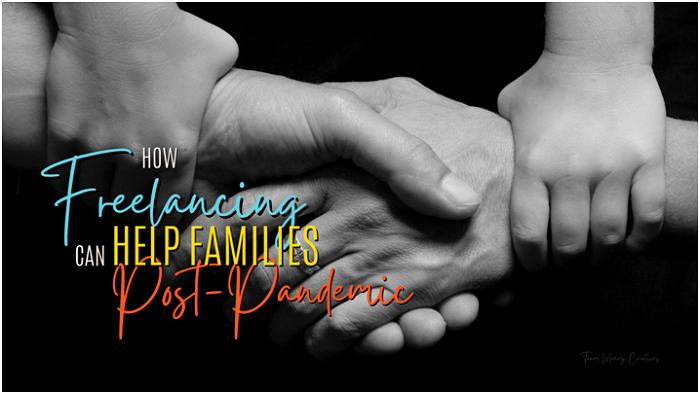
Families around the world were caught in a whirlwind when the Covid-19 pandemic hit in 2020. The global health crisis upended our lives and caused an economic crisis as well. In the wake of the pandemic, thousands upon thousands globally were hit with unemployment. Experts believe that unemployment rates will continue to rise in the next few years.
Countries still whirling from fighting off the pandemic also had to develop ways to provide financial assistance to people as massive lockdowns happened across borders. Although substantial for some countries, the financial assistance cannot fully alleviate the effects of businesses closing down or people losing their jobs.
It is where freelancing and remote work stepped in to rescue a lot of affected families. Freelancing provided an alternative source of income for workers and even business owners amid the pandemic. As the pandemic pinned a significant part of the world’s workforce to their homes, especially in places with stringent social distancing measures, freelancing offered an avenue for continuous income for those who adopted it.
For first-time freelancers, getting hired online was like starting again. Freelancing and doing it online posed new challenges and demanded new skills to cope with work in the new normal economy.
It may be temporary for first-time freelancers, but for those who have been doing freelancing even before the global crisis, 41% of freelancers choose to do it permanently. The benefits of freelancing carry more weight for this percentage of workers, like the flexibility of work location and hours.
What is Freelancing?

Freelancing is when someone does not work for a company or organization exclusively but works for themselves. They are basically self-employed, even if they take on contract work for organizations and companies, and may have a separate, sometimes even a much higher rate than regular, in-house workers.
It is because freelancers are self-employed, and depending on the agreed terms with every job they take, they usually do not get the same benefits that regular workers have. It includes social security payments, health benefits, and paid leaves.
Although different countries are now slowly recognizing freelancers and updating laws to protect the welfare of freelancers in their specific countries, the protocols for freelancers are not yet regulated as much as full-time or part-time worker protocols.
Sometimes, freelancers who do not have signed contracts or agreements with clients can be at risk of non-payment or underpayment. Sadly, some clients often demand more from freelancers compared to what was initially agreed on. These issues are not new to freelancing and need to be addressed by passing laws to protect freelancers’ welfare.
Despite this, many people opt to freelance because freelancing may work best for them and their current situation. In addition, freelancers are not tied to a single company or project and can take on as many as they can serve in a month, thus increasing their chances of earning more than your average worker.
Different Kinds of Freelancers

A freelancer can be an independent supplier or contractor, often called a moonlighter, who has a long-term contract with a client and flexible work arrangements. Some freelancers work part-time, usually because they have several projects or clients at a time, or have a mixture of traditional jobs and freelancing.
In the past, most freelancers were involved in creatives, as designers and artists hired for specific projects or expertise at a determined amount of time.
But today, freelancers come from all walks of life and all kinds of niches. It is now almost synonymous with remote working, also known as a virtual job or work-from-home job. Although not all remote workers are freelancers, and not all freelance jobs are done online or remotely.
How Freelancing Helps in Post-Pandemic Financial Recovery

1. Better Productivity
Surprisingly, a survey reveals that freelancers and remote workers are more productive. A staggering 95 percent of the survey’s respondents noticed an increase in their output while working from home, and 51 percent noticed an increase in productivity from remote working. Even freelancing parents experienced between 49 to 50 percent productivity increase.
Some of the reasons for the jump in productivity are fewer distractions and interruptions, the ability to focus more, a more comfortable work environment, and no office politics, plus no travel time to their employment site.
When you can produce more as a freelancer, you can finish projects faster. Your turn-over rate between projects can be lessened, meaning you can get more projects in a year or produce more output for bigger profits. If you are a hardworking freelancer, you can make more than a decent living for your family, even if you do not go back to your traditional job after the pandemic, which actually happens to a lot of workers who just wanted to try freelancing for whatever reason, and eventually ended up doing it more permanently.
2. Continuous Income Despite Economic Instability
Depending on your niche, you can continue earning a living despite the economic instability brought about by the pandemic. For instance, most computer-based or online workers could keep their jobs while a lot of traditional workers were laid off as businesses had to close.
Even online workers from highly affected areas were spared from layoffs because most of them have clients from other countries. It is why businesses began moving online and started working with distributed teams. These distributed teams can be a mix of traditional-turned remote workers and freelancers too.
Affected non-essential industries were also able to find ways to jumpstart their businesses online. For example, many micro-saas companies in the new normal economy help in web events like concerts, seminars, fashion shows, and the like. Even museums and the like offered digital tours. Tourism and real-estate industries also found ingenious ways to keep earning through virtual tours.
As more opportunities are burgeoning post-pandemic, this provides many opportunities for freelancers to make a mark. Provide relevant and in-demand services that cater to your niche or market’s current needs at this time so you can get continuous income amid changing and challenging times.
3. Low Costs and Expenses
Freelancing is cost-effective, not just for freelancers themselves but for the businesses that lean on them. Essential costs, operational costs, and even onboarding costs are greatly minimized. Businesses can even reduce capital expenses like an office or building rental.
Since most countries only allowed essential industries to keep operating, the rest were reduced to a skeletal workforce and had no choice but to let the rest of their teams work remotely. If more than half of your team cannot come to the office for months and months, you can cost reduce your office space, furniture, energy use, supplies, and outsourcing cleaners or security personnel.
Freelancers also cut costs in many ways. They don’t need to commute, dress up for work every day, or spend money on catered/prepared and the like. The need to get a babysitter, for instance, is also diminished since most freelancers now work from home.
It helps families in their financial recovery because they can optimize earnings as they reduce expenses.
For families with a business, try getting freelancers in the interim between now and until you get back on your feet and can hire regular workers again. You can hire freelance delivery personnel, for instance, if your physical stores are currently closed, and all you can do is deliver your products to your customers. You can hire freelance social media influencers or even use advocacy marketing to boost your online presence.
4. Networking and Personal Brand Building
As a freelancer, you can work on your brand and reputation. As you increase in reputation, expertise, and even popularity, you will eventually earn more. As you network in your niche, you get more opportunities to widen your reach and get more projects.
With freelancing, you don’t have to be stuck with one company or employer. More opportunities to excel and make a name in your niche will be open to you.
As a freelancer, you may not have your marketing team to promote your products and services or an admin team to handle the nitty-gritty of contracts, permits, and the like. But you are your boss. It may take more hard work, but you enrich your own company and your brand, not others.
5. Lucrative Career
As mentioned, freelancers do not have to be stuck in one job only. You can opt to go for the best kinds of jobs in your chosen niche and get the best possible projects and clients. You can choose the amount of money you can earn per month and not be limited by fixed salaries.
And although freelancers may not have the same job security as traditional employees in terms of job tenure, you can set your own financial goals and work your way strategically to meet those goals.
You can upskill and be an expert in your niche and give yourself an edge over other freelancers. Focusing on a couple of expertise is ideal. Employers who hire freelancers and remote workers do so because they opt to have someone in the team who can multitask. For instance, you can be a freelance blogger who also knows how to do SEO (Search Engine Optimization)and SMO (Social Media Optimization). You are like a digital marketing team rolled into one, charge more, and get stellar recommendations for your future projects if you do a good job.
Freelancing also opens up opportunities for you to access jobs and clients that you usually would not have access to if you were to work in a traditional setting. For instance, if you are a freelance web developer or designer, you can get various clients worldwide and get a higher rate for your services.
Even big-name companies that generally would not have taken freelancers and remote workers have opened their doors to this work set-up because of the pandemic. Most of these companies see themselves continuing in this pattern even after the pandemic is over.
Here are some examples of lucrative freelancing jobs you can try:
● SEO (Search Engine Optimization) Specialist

For businesses to rank well on SERP (Search Engine Results Page), their websites’ SEO needs to be on-point. You can provide services as an SEO manager who can analyze web analytics, troubleshoot fundamental site issues in various metrics, including meta description, content security, schema markups, accessibility, readability, mobile responsiveness, just to name a few.
You need to master how to increase website traffic with as little overhead as possible, or running PPC (Pay-Per-Click) campaigns on Google, Bing, Yahoo, and others. In fact, SEO experts today are some of the most valuable and highest-paid freelancers.
● Blogger or Content Writing

Business websites have exponentially multiplied during the pandemic. There is a high demand for content writers from businesses and various companies and organizations that have moved online.
You can write content like blogs, ebooks, social media posts, promotions, email marketing campaigns, and the like. You can write scripts for video posts and podcasts or even be a ghost content writer for brands or individual influencers.
You can also produce an image or video content for your clients if you have the talent for it. You can also collaborate with other freelancers with that expertise. Depending on the quality of content you can deliver and your portfolio, you can charge anywhere between $50 to $500 per hour.
● Social Media Manager (SMM)

Since there are more social media users than any other platform (4.2 billion), social media managers have become more in demand than ever. It’s a staple now among websites to manage social media accounts since most of the market use social media platforms to get curated information for almost everything they’d need to know or access on the internet, like news, videos, webinars, messaging, and the like.
For instance, you can be a freelance social media manager handling customer engagements via comments and messaging apps. Since you can now use different CMS tools to schedule posts on social media, you can handle more than one account at a time and earn more income doing so.
Freelance social media managers are tasked to grow a brand on various social media platforms. Your role is to form social media connections with other brands, plan, implement, analyze marketing promotions, and perform other tasks required to build a social media presence.
● Web Developer and Designer

Another in-demand job these days is in web development. Businesses and companies making an online presence definitely need a website, as it is the new business card for the digital age. You can produce professional-looking websites for different kinds of niches, but it would be best to focus on a niche or two, so you can build a strong portfolio for yourself in those niches.
Aim to be recognized as an expert in your niche to attract more clients and increase your personal brand awareness. Web developers and designers earn anywhere between $500 to $5,000 per website. You can earn more depending on your level of expertise and the complexity of the website you are creating.
● Software and Mobile App Developers

To save on costs, businesses and companies typically hire freelance programmers, software developers, or app developers to create websites and apps that personalize their consumer’s experience. It not only includes the development of a site or app. You can market your services to include troubleshooting as needed by your client at an extra cost.
Since this is a high level of expertise, freelance programmers and developers can earn a lucrative amount for programming and software development jobs.
6. Flexibility
There is much flexibility in freelancing. The majority of freelancers Around go freelancing because they can choose when, where, and how they would complete their tasks. Traditional workers are often stuck with a fixed schedule, and whether they produce something during the day, they can expect a salary by payday.
Freelancing does not work the same way. Freelancers get paid for the job they do, how well they have done it, and how fast it took them to complete it.
If you are a night person, for instance, you can choose to work at this time to produce as much output as you can in a given day. Some freelancers work around 10-20 hours a week to handle other priorities, so they usually take advantage of the time they allotted for work to meet their P.O.’s or quota with a client. It is why experts have noted freelancers to be more productive than traditional, in-office workers.
Freelancers can take advantage of this flexibility and maintain a good work-life balance. For example, freelancing parents need to balance family and children’s time (especially if their children had to go through homeschooling or distance learning).
As a freelancer, you can work from the safety of your home while taking care of your children or homeschooling, or attending to other personal needs.
Even the flexibility of where freelancers work is a big help. You can work from home, work in a workplace-sharing facility, or even a coffee house while passing the time before you can pick your children up from school.
And when the pandemic crisis is neutralized, freelancers can also enjoy flexibility in traveling or simply taking a break from projects.
Conclusion: Rethink Work Strategies for the Future

Self-development is critical for freelancers. As we all witnessed in 2020, even high-paying jobs were not spared from layoffs as business after the business closed temporarily, even for good, because of the pandemic. You need to adapt your career options to stay relevant in the future and secure work opportunities as a freelancer.
Invest in yourself as a freelancer. Aside from investing in your equipment, aim for self-development as well. Attend seminars, webinars, upskill courses, and the like to increase your value as a freelancer. Students pursuing college degrees should also reconsider and rethink their future plans to make sure they are getting relevant and needful courses for the times.
For instance, courses related to IT can lead to software developer jobs that are lucrative among the freelancing community. These jobs are necessary, so they will remain valuable and lucrative for years to come.
Families can bounce back and recover financially through freelancing. Gather courage, venture into the world of freelancing, and see opportunities to earn and learn to open up to your life abundantly.

Author’s Bio:
MayleenMeñez used to work in media before finding her true passion in NGO work, travelling the Philippines and Asia doing so. She homeschools 3 kids and loves reinventing Filipino dishes. She is a resident SEO writer for Softvire Australia and Softvire New Zealand.
MayleenMeñez Social Credentials
Facebook: https://www.facebook.com/mayleenmenez
Twitter: https://twitter.com/MayleenMenez
LinkedIN: https://www.linkedin.com/in/mayleenmenez/
Instagram: https://www.instagram.com/mayleen_menez/















